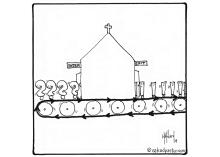In the past few weeks, I’ve spoken with five people who have been deeply wounded by church institutions. I’ve met countless more in previous years.
I regularly receive notes from estranged church folk who want a place to belong and have vital contributions to make, but have been pushed aside.
One of the people who has been most helpful to me in my work with Canadian Mennonite in recent years—providing story ideas, asking brutally pointed questions and sharing occasional recipes—is someone various church leaders avoid.
I belong to a small church made up largely of people who have felt the blunt force of Mennonite institutional protectionism, as I have myself at a few points in life.
It’s not that the people who get ousted, run over, or treated like lepers are always correct or innocent. My point is not that people who ask questions or poke at the status quo are always right. My point is that they belong, and the church must do better at dealing with difference and messiness.
We must do the hard work of welcoming questions and listening to those who are, by nature, crusty back-pew disturbers. (For some reason I have high tolerance for such characters).
The cover article in this issue is about Di Brandt. Brandt grew up in the Mennonite village of Reinland in southern Manitoba. Her 1987 book of poetry, questions i asked my mother, landed her squarely on the church blacklist. The book pushed boundaries and used language uncommon in Sunday School. Predictably, that’s all many people in her village, and in much of the church community, could see.
They saw the fierceness but not the tenderness. They saw the sex but not the sincere grappling with modernity nor the celebration of some aspects of tradition. They could not see that perhaps Brandt was not trying to destroy the church but had something of value to offer. (And I don’t mean to imply that her intended audience was just the church; it was much broader.)
In too many cases, the church response to Brandt has been vilification rather than engagement. That has been a loss for everyone.
Reprinting the title poem from Brandt’s 1987 book in this issue (page 18) does not undo decades of exclusion but it says, in some small way, to Brandt, and others like her: your questions belong; you belong.
More broadly, it says, we’ve gotta stop running people over. We’ve gotta stop sacrificing people to protect budgets, decorum, power and distortions of tradition. We’ve gotta stop confusing the status quo for the kingdom of God. Our calling is higher than conflict avoidance, passive aggression or dismissive condescension.
Jesus’ words to the Pharisees—who put personal and institutional agendas ahead of love—were direct.
In my experience, Christians of all stripes are susceptible to treating certain people as obstacles or adversaries rather than children of God.
Of course, institutional harshness is not the only reality in the church. Many people experience care, belonging and healthy conflict resolution. But lately, I have been overwhelmed by examples of the opposite.
Recently, two people I respect advised me to stay away from a controversial issue because it would be bad for the magazine as an institution. I’m not going to brashly fall on an anti-institutional sword just to court controversy, but if I avoid a sensitive topic primarily for the sake of an institutional budget, I do not deserve the trust of readers.
Institutions are not always wrong; they do much good. Truly. However, when the mission of love and reconciliation, messy as it is, becomes subservient to institutional protectionism, the people of God lose. Too often, the hard work people do to fortify institutions is exactly what drives some good people away.
***
The feature in this issue, as well as Ed Olfert’s column explore different angles of medical assistance in dying (MAID). This topic raises profound questions that touch vulnerable places in many readers’ experience. As always, we welcome your feedback. Share your story.
We look forward to hosting an online discussion about MAID on October 25 at 8 p.m. EST. Stay tuned to canadianmennonite.org/events for details.
Will Braun welcomes feedback at editor@canadianmennonite.org.
Read more editorials:
Tell us what you think
Birding with Alvin
Of beets and chainsaws
Uncommon global access
The poofy blue MCC couch




Add new comment
Canadian Mennonite invites comments and encourages constructive discussion about our content. Actual full names (first and last) are required. Comments are moderated and may be edited. They will not appear online until approved and will be posted during business hours. Some comments may be reproduced in print.